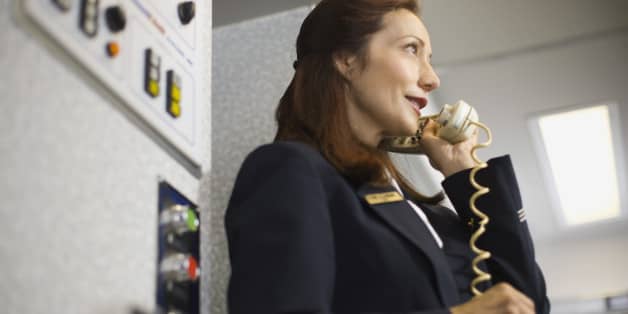Once you board a plane, you begin to worry about every little thing that happens around you, unless you are a frequent traveler. Even if you do not have flying anxiety, you feel the need to understand what the flight crew is saying. Every place has its own set of operating procedures and jargons, but there are a few terminologies that are common to most airlines. A crew member walks past saying words like ‘all-call,’ ‘jump seats’ and you are unable to decipher what that is about.
We have collected some of the most commonly used jargons on the flight by the cabin crew and what they mean.
“Prepare doors for departure/arrival.”
At the bottom of an aircraft, door are packed witg the evacuation slides designed to deploy automatically with compressed carbon dioxide and nitrogen in just six seconds whenever there is an emergency. The slides deploy only if a crew member has pushed a lever on the door connecting the slide to the sill. Every time prior to departure or arrival a crew member ‘arms’ the door that either means lowering or raising the lever, depending on the aircraft model. Sometimes it requires a bar to be secured to the latches on the floor. In some older crafts, a strap has to be placed across the cabin door windows. If an armed door opens accidentally, a slide could pop out onto the gate agent, so the gate security is very crucial.
“Cross-check” and “cross-check complete.”
When the flight attendants have prepared for arrival or departure, another crew member cross checks the door. To verify that the doors are prepared for an emergency evacuation the team members often say “Doors are armed and cross-check complete.” Some airlines communicate the checks over Public Address systems, and some do it on private intercoms.
“All-call.”
Since different airlines have different systems for cross-check verification, either on PA or intercoms, so phrases like “all-call” and “standby for all-call,” are a part of this conference style communication over the intercom where the crew members inform from their assigned positions.
“Jump seat.”
There are small seats on the plane that the flight attendants take during takeoff, landing, and turbulence. These are referred to as “jump seats” because they close automatically when they stand up.
“Bulkhead.”
The dividing wall ahead of the first row that separates the cabin seating from the galley or lavatory is called bulkhead.
“Extender.”
Before an aircraft is pushed back from the gate for departure, the passengers are required to have their seat belts fastened. If a larger passenger can not fit in the standard lap belt, they are given a seatbelt extension, which is called “extender” for short. It adds to the seat belt length by 25 inches.
“Spinner.”
When passengers arrive for their flights at the last moment, and they do not have a seat assignment, they are allowed to board the plane and find an empty seat. The flustered passenger trying to find a seat is termed as a “spinner” by the crew, and a flight attendant may be heard talking on the intercom saying “We have a spinner mid-cabin. Are there any seats in the back?”
“Demo.”
Generally “demo” is just a short for the word demonstration but the flight crew uses the word to refer to the pre-flight passenger safety briefing. To demonstrate how to fasten the seat belts, the attendants usually use the seat belt extenders.
“Deadhead.”
When an on-duty flight member is flying as a passenger, i.e., they are headed home after the flight or to an airport to catch a flight home; they are referred to as ‘deadhead.’ When a crew member gets sick, the crew scheduling system of the airline will ‘deadhead’ the pilot or the flight attendant to the city to get a replacement.
“Redeye.”
Redeye refers to an overnight flight which means a graveyard shift for the crew members. The more experienced crew members particularly like such flights as the service is easier as most passengers sleep. It might be a tad more difficult for the new flight attendants who are not used to it.
“Equipment.”
In the airline jargon, the airplanes are called “equipment.” When the staff says “Equipment looks good” it means the plane is in good condition and there are no mechanical issues. So, if a crew member says “We are delayed because we need an equipment swap,” you know what that means.
“Runners.”
You might hear phrases like “We’re waiting for runners” that means there are passengers on a connected flight that is late. The crew would most likely be using the term with each other because the passengers are probably running through the airport, and the crew has to get their luggage on the plane and get them seated as quickly as possible to the plane departs on time.
Apart from the phrases used during the standard operation of an airplane, you might hear chimes ringing on board. With a different number of these rings, different airlines mean different things. This could either be a warning of a choppy air ahead or just a notification saying the plane is above or below 10,000 feet. The same ‘ding’ could sometimes indicate that a call button was pressed. When passengers overuse the button and annoy the flight attendant, they often call it “the abuse button.”
Source: Beth Blair | BBC


